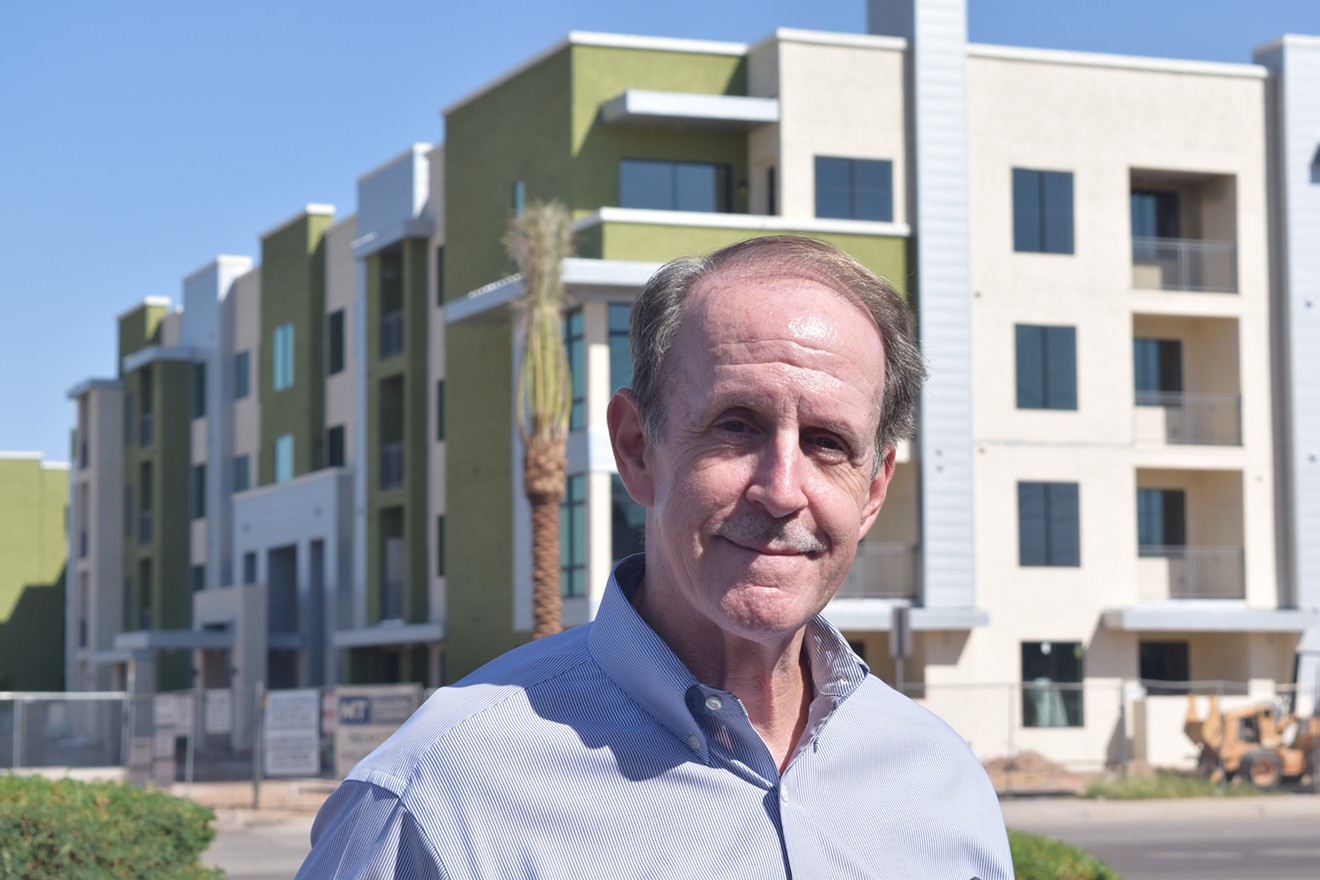The man who calls himself "one of the fathers of the charter school movement" says it's time to reform Arizona's charter schools.
If elected superintendent of public instruction, Frank Riggs says he'll push to do just that. And he'll lobby for more school funding and to keep creationism out of science classrooms.
A former California congressman, Riggs narrowly clinched the Republican nomination for superintendent in the August 28 primary.
Despite his deep ties to the charter school sector, in an interview with Phoenix New Times on Monday, Riggs endorsed the idea of greater oversight of Arizona charter schools.
"What I've said to the charter school folks is, 'You need to get your act together, you need to police your sector, and you need to call out your bad actors, because if you don't, you're going to get regulation,'" Riggs said.
Last month, Riggs beat incumbent superintendent Diane Douglas and three others in the Republican primary contest. In the final vote tally released by the Arizona Secretary of State on Monday, Riggs edged out runner-up Robert "Bob" Branch by 249 votes. Douglas finished third place, 3,171 votes behind Branch.
Riggs will face speech therapist and first-time candidate Kathy Hoffman in November.Unlike Hoffman, who participated in the #RedForEd school walkout, Riggs has doubts about the motivations of the #RedForEd leaders...
tweet this
A longtime politician – he ran for governor of Arizona in 2014, but finished last in that year's Republican primary – Riggs contrasted his governing experience with that of his 32-year-old Democratic opponent.
"Ms. Hoffman is an extremely nice young lady," Riggs said. "We've had pleasant conversations at the few bipartisan forums that we've done. She has zero, not one single day, of leadership experience in any capacity – in education or anything else, for that matter."
As a speech pathologist, Hoffman does not qualify as a classroom teacher, Riggs argued. And he also riffed on her campaign signs that read, "I am Public Education."
"With all due respect, I am public education," Riggs said, pointing to his previous work as an elected public school board member in Windsor, California, and the board president of an online charter school. "I have a deep legislative and political background."
After serving in Congress in the 1990s, Riggs moved to Scottsdale in 2002 and started working as an administrator in the charter school sector shortly thereafter.
As a congressman, Riggs sponsored the federal Charter School Expansion Act of 1998, which provided grant funding to charter schools. And Riggs spent almost a decade as the CEO of a nonprofit that funded the startup and construction costs of new charter schools.
But in the Arizona charter industry, examples of mismanagement, lax oversight, and shady insider payouts have occurred on a routine basis.
Riggs repeatedly emphasized that the sector needs reform. All the same, he said that he doesn't feel responsible for the state of the sector, in spite of his work supporting charter schools in Congress and the nonprofit realm.
"I never envisioned the possibility that there might be individuals in the charter school sector who would figure out ways to really profiteer, to enrich themselves," Riggs said.
Earlier this month, Attorney General Mark Brnovich, a Republican, said that lawmakers should pass legislation that gives the state much-needed oversight to prevent charter operators from getting rich at the expense of students.
Riggs promised that if elected, he will push the Arizona State Board for Charter Schools to open more of its records to the public and to require charter schools to have boards that are made up of a majority of unbiased individuals – not friends or family of the operator.
He also said that the state Legislature should enact a tougher ethics law that precisely defines "what constitutes a financial conflict of interest under Arizona law" in order to prevent lawmakers from crafting legislation when they stand to benefit financially.
Some of his positions place him closer to his opponent than your average Arizona Republican. You won't hear Riggs praise President Donald Trump, and he opposes a controversial private school voucher expansion.
Riggs is quick to acknowledge that a teacher pay and education crisis exists in Arizona. And like Hoffman, he promises to use his bully pulpit at the state Department of Education to convince legislators to boost Arizona's per-pupil funding, which ranks among the lowest nationwide.
He's skeptical of a broad expansion of school vouchers known as Empowerment Scholarships Accounts, or ESAs, which allow parents to send their kids to private or parochial schools on a state-funded debit card. In 2017, the Legislature greatly expanded ESA eligibility to include all Arizona students. Opponents gathered enough signatures to put the law to the voters in a referendum this fall, Proposition 305.
Breaking with many of his Republican peers, Riggs opposes Prop. 305. He would prefer that the ESAs are means-tested so that the state-funded debit cards are limited to low-income families.
"If the household income falls under the federal free and reduced-price lunch programs, and they determine that an ESA will help further their child's education, then they can have one," Riggs said.
He added that he supports maintaining several other existing categories eligible for ESAs, such as students with disabilities or students from military families.
Riggs strongly supports "parental empowerment and school choice," although he is careful to say that he does not favor an endless march to privatize public education.
"I understand that our district schools are the backbone of our education system, and I want to do everything in my power to improve and strengthen them," Riggs said.
During the campaign, Riggs said, he was accused of being the "Never Trump" candidate. Branch, the second-place candidate in the Republican primary for superintendent, used the slogan, "Make Education Great Again!"
When asked about Trump, Riggs criticized him over his draft deferments; his attacks on a federal judge, Gonzalo Curiel, whom Trump said was unfair because of his Mexican heritage; and Trump's treatment of women.
"Let's put it this way: I like his Supreme Court nominees," Riggs said.
Riggs also made it clear that he believes evolution to be "proven scientific fact." He said he wants evolution taught in Arizona science classrooms.
Contrast Riggs with the incumbent Douglas, who has endorsed teaching creationism and intelligent design in public schools along with evolution.
This spring, Douglas, sought to revise Arizona's science standards to de-emphasize evolution. Riggs suggested that the effort was a "transparently political" move to help her re-election bid for the primary.
"I think Mrs. Douglas was going down that path as kind of a Hail Mary, last-ditch effort to sort of resurrect her re-election campaign," Riggs said.
On other issues, however, Riggs holds more conservative views.
Unlike Hoffman, who participated in the #RedForEd school walkout, Riggs has doubts about the motivations of the #RedForEd leaders who advocate for increased teacher pay and school funding. He criticized the decision by educators to go on strike in late April, pointing out the fact that Arizona Governor Doug Ducey had already proposed giving teachers a 20 percent raise by 2020.
"I don't like the fact that the #RedForEd movement kind of transformed into a very, very partisan political effort, with leadership that is clearly very, very partisan," Riggs said.
And in terms of changes to the curriculum, Riggs would rather see a greater emphasis on civics, as well as the beliefs of the founding fathers.
"I just want to make sure in the history and government civics curriculum, our young people learn that our founding fathers believed in a Creator," Riggs said.
He argued that young people are receiving a deficient education in civics and American government, broadly speaking. "The real point is to inspire young people to take an interest in our history, our government as a country, and to encourage them to be active, engaged citizens in our system of self-government," he said.
Hoffman, in a brief interview on Monday, suggested that the differences between her and Riggs will be evident during the campaign.
“I’m confident that Arizona voters want to see an educator in the role of superintendent of public instruction," Hoffman told New Times. "And after two decades of Republican politicians leading our schools, we’ve seen the devastating effects."
A poll conducted last week by OH Predictive Insights shows that the race is essentially tied.
Yet Riggs has spent much of his life in the middle of tough campaigns. He's an experienced politician, though not always a successful one.
From 1991 to 1999, the Army veteran and former police officer served three nonconsecutive terms representing California's First Congressional District. He sponsored a variety of education-related legislation, including the Charter School Expansion Act, which made competitive grant funding available to charter schools nationwide for their start-up and expansion costs.
He left his seat in 1998 in order to run for the Republican nomination for U.S. Senate in California, but his campaign struggled. Riggs ultimately paused his campaign after realizing that his political career was taking him away from his family. He took third in the primary.
Riggs turned down highly paid lobbying job offers, he said, and instead opted to relocate his family to Arizona in 2002. He took a job with ABS School Services, a for-profit company that provided management and accounting services to district and charter schools across the state.
The company was sold to Sylvan Learning, and he later worked as a top executive at a Sylvan subsidiary company called Educate, Inc.
Meanwhile, Riggs served as a board member of the nonprofit Charter Schools Development Corporation becoming CEO in 2004 and serving in the position until 2012. For two years, he was also the board president of a statewide online K-12 charter school, Arizona Connections Academy.
He denied that his work in the charter sector has made him a great deal of money. He said that his personal wealth has come from a real estate investment portfolio that he built steadily after leaving Congress.
Is he wealthy now?
"Depends on your definition of wealth," Riggs said. He had arrived for the interview near Shea Boulevard and 32nd Street in a Cadillac. While in charge of the CSDC, Riggs estimated that his annual salary doubled over eight years from around $150,000 to $300,000.
So, is he a millionaire?
"In terms of net wealth, net worth? Yeah, probably." Riggs said. "But you know why? Because I have had a successful real estate business since the mid-1980s."
Ray Stern contributed reporting.













